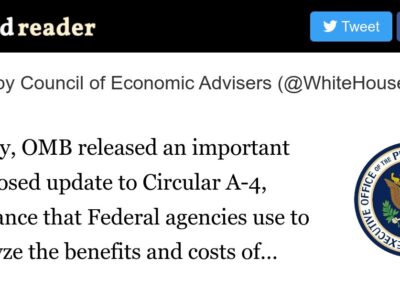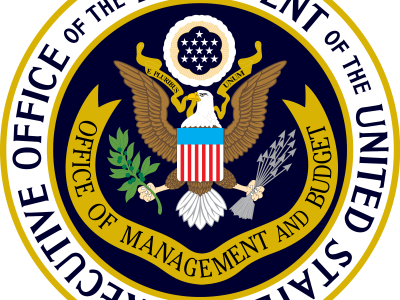Cost Benefit Analysis
Does the Law Require Cost-Benefit Analysis?
According to the D.C. Circuit, the answer is no.
Putting aside the particulars of the case, it seems wrong to apply the same standard (monetized cost-benefit analysis) to every provision in environmental law. These provisions have different language, reflecting differences in congressional priorities. Some provisions, for instance, may be designed push industry to find innovative solutions; others may reflect Congress’s value judgments or a desire to limit EPA’s discretion. We shouldn’t assume that the myriad differences in statutory language are irrelevant and that Congress wanted agencies to adopt the same method of making decisions in every case.
CONTINUE READINGTrump Shoves Economic Analysis and Science to the Curb
The MAGA agenda takes precedence over data and analysis.
If you were looking for data-driven regulatory policy, you’re not going to find it in this Administration. On the contrary, Trump has marginalized economic analysis and wants to bulldoze environmental science. Thus, we are likely to get policies that are bad for the environment without being cost-justified, while ignoring policies who environmental benefits outweigh economic costs.
CONTINUE READINGTrump & Environmental Policy: The Sequel, Part I
Expect a lot of the same, but there could be some new twists.
They say that history never repeats itself, but it often rhymes. As in many sequels, there will be many things we’ve seen before. Much of that consisted in an all-out attack on environmental law. If you hated the original, you won’t enjoy watching the same thing the second time around. This will include massive regulatory rollbacks and expansion of fossil fuels regardless of environmental harms.
CONTINUE READINGThe Revenge of the Lawyers
Economists ousted lawyers (and law) from their central role in the regulatory process. That’s changing.
As you’ve probably heard, the Biden Administration has proposed aggressive new targets for greenhouse gas emissions from new vehicles. That’s great news. One really important aspect of the proposal relates to the justification for the proposal rather than the proposal itself. Following a recent trend, the justification is based on the factors specified by Congress …
Continue reading “The Revenge of the Lawyers”
CONTINUE READINGRevamping Cost-Benefit Analysis
Proposed changes will make CBA more climate friendly.
Last week, the Biden White House released proposed changes in the way the government does cost-benefit analysis. CBA has been a key part of rule making for forty years. The proposal is very technical and low-key, but the upshot will be that efforts to reduce carbon emissions will get a leg up. In particular, the …
Continue reading “Revamping Cost-Benefit Analysis”
CONTINUE READINGCutting 290,000 Tons of Water Pollution a Year, One Coal Plant at a Time
Coal is a dirty fuel. It’s not just air pollution or climate change.
EPA proposed new regulations next week to reduce the water pollution impacts of coal-fired power plants. As EPA regulations go, these count as fairly minor. They got a bit of news coverage in coal country and industry publications. But they will eliminate the discharge of thousands of tons of pollutants, including a lot of metals …
Continue reading “Cutting 290,000 Tons of Water Pollution a Year, One Coal Plant at a Time”
CONTINUE READINGWasting Gas
A proposed rule limiting flaring and venting of natural gas is a win for everyone except greedy oil and gas operators.
Yesterday, the Interior Department posted a proposed rule to limit flaring and venting of natural gas on public lands. The rule will be good for everyone except the oil and gas operators who waste the gas, increasing methane and carbon emissions while giving the public nothing in return. The rule is clearly a step in …
Continue reading “Wasting Gas”
CONTINUE READINGCost-Benefit Analysis and Deep Uncertainty
How should agencies take into account “the things we know we don’t know”?
Since 1981, cost-benefit analysis (CBA) has been at the core of the rule making process. OIRA, the so-called “regulatory czar” in the White House, must approve every significant regulation based on a review of its CBA. But CBA has had a major blind spot. It embodies techniques for analyzing possible harmful outcomes when the probability …
Continue reading “Cost-Benefit Analysis and Deep Uncertainty”
CONTINUE READINGUnquantified Benefits
How can the government account for benefits that it can’t measure?
Like it or not, quantitative cost-benefit analysis has been a key part of the regulatory process for forty years and seem likely to stay that way. Yet even economists admit that they don’t (yet) know how to put numbers on the value of some important regulatory benefits. But how can those qualitative assessments be combined …
Continue reading “Unquantified Benefits”
CONTINUE READINGEnvironmental Justice, Truck Pollution, and the Biden EPA
How will EPA integrate EJ into its rule making? The answer remains murky.
EPA recently released a notice of proposed rulemaking for pollution from new heavy-duty vehicles. I was interested to see how environmental justice figured into the analysis, looking for clues about how the Biden Administration plans to make EJ part of decision making. What I found wasn’t very enlightening. Perhaps they’re still trying to come up …
Continue reading “Environmental Justice, Truck Pollution, and the Biden EPA”
CONTINUE READING













